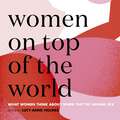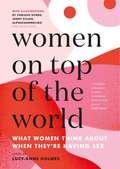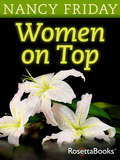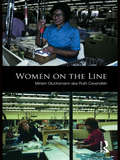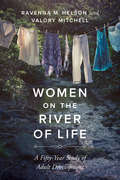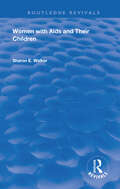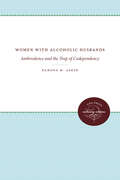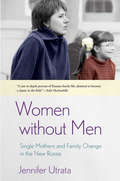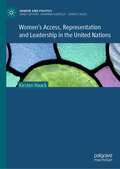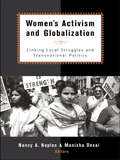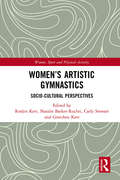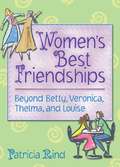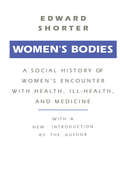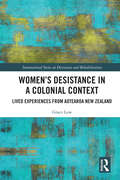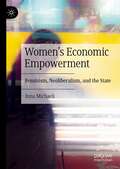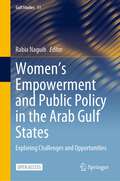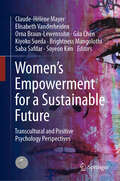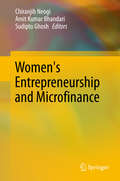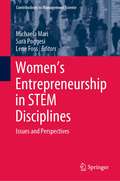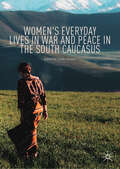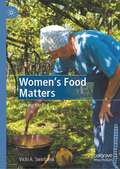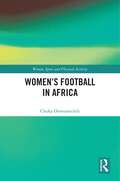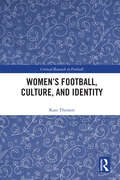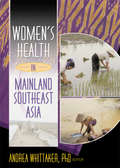- Table View
- List View
Women on Top of the World
by Lucy-Anne Holmes'A brilliant testament to those reclaiming their sexual power' - RUBY RAREWhat goes through a woman's head while she's having sex?Women on Top of the World is a collection of 51 first person testimonies by 51 women from around the globe, from all ages and from all walks of life. Searingly honest, they reveal their innermost thoughts and feelings during sex to writer Lucy-Anne Holmes. The result is an incredible compendium of true disclosures that are funny and sad, shocking and tender.Every experience is different, unique and fascinating. From 19-year-old Melodie in the UK to 32 year-old Wambui from Kenya and 74-year-old Lucy in New Zealand, we as readers are led down as many paths as there are ways to have sex. There are heterosexual women, gay women, bisexual women, queer women, monogamous women, polyamorous women, those who identify as non-binary and transgender women. There is beautiful sex, bored sex, auto-sexuality, crazy sex, tantric sex, sad sex and sex that is experienced as colours and melted toffee. The result is a stunning, transportive book that will help quench the obvious thirst for narratives for women by women about their journeys of sexual self-discovery.(P)2021 Quercus Editions Limited
Women on Top of the World: What Women Think About When They're Having Sex
by Lucy-Anne Holmes'A brilliant testament to those reclaiming their sexual power' - RUBY RARE'Searingly honest ... A beautiful and important work' - VANITY FAIR'This is a book that really should be pressed into the hands of a generation of young men who have learnt everything they wanted to know about sex but were afraid to ask from porn ... Holmes has done an admirable job' SUNDAY TIMES'An important read for any young women starting out on their sexual life' SUNDAY INDEPENDENTWITH ILLUSTRATIONS BY CHRISSIE HYNDE, JENNY ECLAIR AND MANY OTHERSWhat goes through a woman's head while she's having sex?Women on Top of the World is a collection of 51 first person testimonies by 51 women from around the globe, from all ages and from all walks of life. Searingly honest, they reveal their innermost thoughts and feelings during sex to writer Lucy-Anne Holmes. The result is an incredible compendium of true disclosures that are funny and sad, shocking and tender.Every experience is different, unique and fascinating. From 19-year-old Melodie in the UK to 32 year-old Wambui from Kenya and 74-year-old Lucy in New Zealand, we as readers are led down as many paths as there are ways to have sex. There are heterosexual women, gay women, bisexual women, queer women, monogamous women, polyamorous women, those who identify as non-binary and transgender women. There is beautiful sex, bored sex, auto-sexuality, crazy sex, tantric sex, sad sex and sex that is experienced as colours and melted toffee. A range of hugely talented, cutting-edge artists from all over the world - both male and female - have given their visual interpretations with rich and remarkable illustrations that convey the range of emotions contained within these intimate revelations.The result is a stunning, transportive book that will help quench the obvious thirst for narratives for women by women about their journeys of sexual self-discovery.
Women on Top: How Real Life Has Changed Women's Sexual Fantasies
by Nancy FridayA classic work on how women think about sex, from the New York Times–bestselling author of My Secret Garden and My Mother/Myself. Nancy Friday&’s groundbreaking books such as Forbidden Flowers offered an unprecedented honest look at the inner fantasy lives of ordinary women. In Women on Top, Friday returns to this topic, collecting detailed sexual fantasies from over 150 contemporary women from diverse backgrounds. Based on intimate personal interviews and letters, this book updates the conversation started in her earlier works on women&’s sexual fantasies, detailing how women&’s erotic lives have changed—and remained the same. &“This absorbing, titillating and empowering feminist book is also a ribald bedside companion.&” —Publishers Weekly
Women on the Line
by Miriam Glucksmann aka Ruth CavendishWomen on the Line is a pioneering ethnographic classic of the world of work in a British motor components factory. Miriam Glucksmann (aka Ruth Cavendish), a well-known contributor to the study of gender, work and employment, is for the first time revealed as the author, along with the identity of the company, product and factory. Recording the experience of migrant women from Ireland, the Caribbean, and the Indian subcontinent with the immediacy of a diary, this is a unique account from an observing participant of the daily routines of repetitive work, a strike led by women from below, and the temporalities of work, home, children and leisure. Glucksmann's vivid narrative of life on the assembly line is combined with an analysis of the intersections of gender, ethnicity and class that prefigures subsequent theoretical advances. This edition contains a new introduction situating the book in contemporary debates and developments and includes original photographs taken on the shop floor at the time.
Women on the River of Life: A Fifty-Year Study of Adult Development
by Ravenna M Helson Valory MitchellCommenced in 1958 with 142 young women who were seniors at Mills College, the Mills Study has become the largest and longest longitudinal study of women’s adult development, with assessments of these women in their twenties, forties, fifties, sixties, and seventies. Women on the River of Life synthesizes five decades of research to paint a picture of women’s personality and development across the lifespan. The book explores questions of family, work, life-path, maturity, wisdom, creativity, attachment, and purpose in life, unfolding in the context of a rapidly changing historical period with far-reaching consequences for the kinds of lives women would envision for themselves. Helson and Mitchell breathe life into abstract theories and concepts with the real-life stories and voices of the study’s participants. Woven throughout the book are the authors’ reminiscences on the profound endeavor of sustaining a longitudinal study of women’s lives through time.
Women with AIDS and Their Children
by Sharon E. WalkerFirst published in 1998, this study is about courageous women with AIDS who revealed their emotional pain and the concomitant struggles of living with HIV+, and their children. They describe their psychological reactions to the diagnosis itself and to the disease trajectory, and the way in which living with HIV has impacted their relationships with their children.
Women with Alcoholic Husbands: Ambivalence and the Trap of Codependency
by Ramona M. AsherIn this important study of women with alcoholic husbands, Asher vividly describes the process of coming to terms with a profound crisis in one's private life. From interviews with more than fifty women, all of whom were participants in family treatment programs, she assembles a composite picture of the experiences shared by wives of alcoholics. The testimony given by these women illustrates the steps they must take to regain control of their lives. The first step is figuring out what is happening and deciding what to do about it. Asher argues that the vogue of using the label "codependent" may actually hinder rather than facilitate emotional health. Led to think of themselves as addicted to their husbands' addictions the wives of alcoholics may be persuaded that their own problems can't be overcome. But, Asher shows, these women can take command of their lives.Originally published in 1992. A UNC Press Enduring Edition -- UNC Press Enduring Editions use the latest in digital technology to make available again books from our distinguished backlist that were previously out of print. These editions are published unaltered from the original, and are presented in affordable paperback formats, bringing readers both historical and cultural value.
Women without Men: Single Mothers and Family Change in the New Russia
by Jennifer UtrataWomen without Men illuminates Russia's "quiet revolution" in family life through the lens of single motherhood. Drawing on extensive ethnographic and interview data, Jennifer Utrata focuses on the puzzle of how single motherhood--frequently seen as a social problem in other contexts--became taken for granted in the New Russia. While most Russians, including single mothers, believe that two-parent families are preferable, many also contend that single motherhood is an inevitable by-product of two intractable problems: "weak men" (reflected, they argue, in the country's widespread, chronic male alcoholism) and a "weak state" (considered so because of Russia's unequal economy and poor social services). Among the daily struggles to get by and get ahead, single motherhood, Utrata finds, is seldom considered a tragedy. Utrata begins by tracing the history of the cultural category of "single mother," from the state policies that created this category after World War II, through the demographic trends that contributed to rising rates of single motherhood, to the contemporary tension between the cultural ideal of the two-parent family and the de facto predominance of the matrifocal family. Providing a vivid narrative of the experiences not only of single mothers themselves but also of the grandmothers, other family members, and nonresident fathers who play roles in their lives, Women without Men maps the Russian family against the country's profound postwar social disruptions and dislocations.
Women's Access, Representation and Leadership in the United Nations (Gender and Politics)
by Kirsten HaackThe face of international politics has changed significantly in the 21st century: it has become increasingly female. Whether that includes women in multilateral meetings, global conferences and embassies, or women at the UN and one of its many agencies in the field, it is apparent that women are accessing leadership positions in a variety of areas. This book investigates the development of gender equality at the United Nations by analyzing women in leadership roles. This introduction of empirical feminism to the study of international organizations applies what is known about women’s participation and representation in comparative politics and gender studies to the United Nations System. It traces women’s access to leadership roles, and explains where and why a range of hurdles prevent women from participating in the work of the UN. In doing so, it offers insights into recruitment and human resources practices and their politics, and into leadership by bureaucratic actors.
Women's Activism and Globalization: Linking Local Struggles and Global Politics
by Nancy A. Naples Manisha DesaiFirst published in 2002. Routledge is an imprint of Taylor & Francis, an informa company.
Women's Agency and Social Change
by Meeta DekaWomen's Agency and Social Change: Assam and Beyond focuses on varied oppression, power relations and ideologies embedded in the complex yet interdependent social, political, economic and legal structures, and women's subordination therein. British intervention, 1826-1947, by itself did not impact the agency aspect on women directly, but the emergence of new forces and factors sowed the seeds of women's agency to impact social change, even if minimal. In the post-Independence period, British colonial legacy perpetuated the subordination of women through caste and class hierarchy at several levels, but an undercurrent of a feminist struggle persisted, not merely as a movement but also at individual levels. The book is written with the hope of encouraging future research on women's experiences in the Northeastern region of India, and elsewhere; hence, a discussion on sources, methods and methodology is included in the conclusion. This book is based on the belief that knowledge production is, in itself, the praxis against oppressive structures and the need to understand the historical processes that slowly transformed women to become catalysts of social transformation.
Women's Artistic Gymnastics: Socio-cultural Perspectives (Women, Sport and Physical Activity)
by Roslyn KerrThis book lifts the lid on the high pressured, complex world of women&’s artistic gymnastics. By adopting a socio-cultural lens incorporating historical, sociological and psychological perspectives, it takes the reader through the story and workings of women&’s artistic gymnastics. Beginning with its early history as a &‘feminine appropriate&’ sport, the book follows the sport through its transition to a modern sports form. Including global cases and innovative narrative methods, it explores the way gymnasts have experienced its intense challenges, the complexities of the coach-athlete relationship, and how others involved in the sport, such as parents and medical personnel, have contributed to the reproduction of a highly demanding and potentially abusive sporting culture. With the focus on a unique women&’s sport, the book is an important read for researchers and students studying sport sociology, sport coaching, and physical education, but it is also a valuable resource for anyone interested in the development of sporting talent.
Women's Best Friendships: Beyond Betty, Veronica, Thelma, and Louise
by Patricia RindExplore the distinct relationships of close female friends!Women’s Best Friendships: Beyond Betty, Veronica, Thelma, and Louise gives new and comprehensive insight into the complex world of women’s closest friendships. Recent studies have shown that women place enormous value on best friendships and consider them to be woven tightly into the fabric of their lives. Using in-depth interviews, along with close readings of relevant literature and theory, this book focuses on the many facets of these relationships. With heartfelt first-person accounts and insightful commentary from the author, this book examines three intertwining themes: feelings of competition, issues of dependence and independence, and knowing/understanding. This book sheds light on areas of tension among women, especially difficulties in communication, frustration about not being entirely let into a friend’s life and thought processes, and the feeling that one friend may value the friendship more than the other. It also discusses women’s struggles to maintain closeness over increased distances and the realization that one’s friends are flawed, even as friends. This informative book, grounded in established research and theory, presents stories of real friendships--told by the people who live them. These women talk candidly about what makes a best friend, about navigating the choppy waters of friendship, and much more: “Somehow, when we started living farther apart there were ways in which we were being insensitive. We recognized that there was a really strong bond, but we were taking it for granted. So we talked about how close we feel to one another and perhaps how that leads to some arguments or hurt feelings.” --Liz, on how distance has affected her relationship with her best friend Susan“Em and I don’t fight at all. I don’t know if that’s good or bad. I don’t think I do well with fights. I think that’s probably a lot of conflict avoidance on my part. And I think it does lead to some distance, even though it’s a best friendship. I think I’m uncomfortable asserting myself. And so it’s easier not to have to do that. So maybe my inability to deal with the problems keeps the friendship at a distance, where it’s safe and comfortable for me, in that one respect.” --Linda, about her desire to avoid any confrontation with Emily, her best friendWomen’s Best Friendships: Beyond Betty, Veronica, Thelma, and Louise is a fresh and exciting look at the inner workings of relationships between women. Drawing upon a multitude of issues and insights, this book is a must-have for women’s studies classes.
Women's Bodies: A Social History of Women's Encounter with Health, Ill-Health and Medicine (Pelican Ser.)
by Edward ShorterWhat has been the source of women's oppression by men? Shorter argues that women were victimized by their own bodies. Exploring five centuries of medical records and folklore from Europe and the US, he shows how pregnancy, childbirth, and gynecological disease have kept women in positions of social
Women's Desistance in a Colonial Context: Lived Experiences from Aotearoa New Zealand (International Series on Desistance and Rehabilitation)
by Grace LowThis book adds to global knowledge of pathways out of crime (desistance) by exploring the desistance narratives of 15 women with histories of imprisonment in Aotearoa New Zealand (10 of whom identify as Māori, New Zealand’s Indigenous population). By voicing these women’s experiences, the book adds to desistance research by moving beyond the mainstream Western nations which dominate desistance literature (such as the United States and UK), to explore how historical and structural influences – including Aotearoa New Zealand’s colonial history – shape women’s offending and desistance trajectories.This book explores the women’s journeys in and out of crime, including the various socio-structural constraints which could impede the women’s desistance efforts, especially for Māori women, who are overrepresented in Aotearoa New Zealand’s prison population. This book explores the influence of the women’s personal relationships (with families of origin/whānau, intimate partners, friends/associates, and children) and their institutional interactions (i.e., their experiences of employment, drug/alcohol addiction treatment and other forms of rehabilitative support). The book also takes a close look at the role of housing – and the more subjective notion of ‘home’ – in the women’s offending and desistance journeys. It makes recommendations for policy and practice to support women leaving prison in Aotearoa New Zealand (and internationally) with an emphasis on the importance of wider community support.This book makes an original contribution to desistance literature by bringing greater conceptual clarity to gendered aspects of the desistance process and how these manifest in a colonial setting. It will appeal to students and scholars of criminology, desistance, gender studies, recovery from addiction, and to practitioners and policy makers in these fields.
Women's Economic Empowerment: Feminism, Neoliberalism, and the State
by Inna MichaeliChallenging the simplistic story by which feminism has become complicit in neoliberalism, this book traces the course of globalization of women’s economic empowerment from the Global South to the Global North and critically examines the practice of empowering low-income women, primarily migrant, indigenous and racialised women. The author argues that women’s economic empowerment organizations become embedded in the neoliberal re-organization of relations between civil society, state and market, and in the reconfiguration of relations between the personal and the political. Also examined are the contractual nature of institutional arrangements in neoliberalism, the ontological divide between economy and society, and the marginalisation of feminist economics that persists in the field of women’s economic empowerment. The book will be of interest to scholars and students of social sciences, gender studies, sociology, and economics. This book is based on the author’s doctoral dissertation at the Humboldt University of Berlin, Faculty of Humanities and Social Sciences.
Women's Empowerment and Public Policy in the Arab Gulf States: Exploring Challenges and Opportunities (Gulf Studies #11)
by Rabia NaguibThis open access book explores the various dimensions of women’s empowerment in public policy in the Gulf Cooperation Council (GCC) region, with a particular focus on Qatar, comparing the country to the other Gulf states. Through its rich compilation of empirical qualitative research, the text unpacks the various ways in which women’s empowerment materializes in the GCC context, providing insights into public policy perspectives in high-income rentier states more broadly. The Arab world has long been part of the global dialogue on women’s economic and political empowerment and the GCC has, over the past decade, situated women’s empowerment amongst their respective national priorities and long-term strategies. In turn, the Gulf has seen gradual implementation of policies aimed at women, specifically, in looking to attract and retain them in the labour market, and in the public sector more broadly. The collection surveys and evaluates the progress made in recent decades, paying close attention to the cultural and policy constraints still limiting women’s empowerment in the Gulf. With a key linkage to SDG5, this book is a timely text addressing the context and drivers behind policies centering on women in the Arab region, in its analysis of the interplay of international women’s empowerment discourse and regional public policy decisions. It is relevant to researchers and policy makers focused on women and gender issues in relation to social, cultural, economic, and political empowerment in the Gulf specifically, but also in the Arab world and beyond.
Women's Empowerment for a Sustainable Future: Transcultural and Positive Psychology Perspectives
by Kiyoko Sueda Saba Safdar Elisabeth Vanderheiden Claude-Hélène Mayer Soyeon Kim Orna Braun-Lewensohn Gila Chen Brightness MangolothiThis edited volume focuses on women’s empowerment for a sustainable future. It takes cultural and transcultural and positive psychology perspectives into consideration and explores the topic of women’s empowerment from diverse stances, across social strata, cultural divides as well as economic and political divisions. It addresses the critique of the overly Western focus of positive psychology on this topic by adopting a transnational and transcultural lens, and by taking non-WEIRD (Western, Educated, Industrialized, Rich, Democratic) samples into in-depth consideration. The chapters therefore focus on women from diverse socio-cultural, political, socio-economic backgrounds and discuss their ways of empowering others and being empowered. They also discuss related positive psychology constructs, such as: coping, resilience, transformation, growth, leadership, creativity, identity development, sustainable action, as well as positive socio-economic, political and eco-sustainable thought and action. The volume as a whole looks at women's leadership as a factor of empowerment. A further fundamental assumption is that women’s empowerment is needed to create a sustainable future at micro-, meso- and macro levels, which presumes safety, peace, ecological considerations, and compassionate leadership.
Women's Entrepreneurship and Microfinance
by Chiranjib Neogi Amit Kumar Bhandari Sudipto GhoshThis book offers a critical perspective on the issues related to women’s empowerment, microfinance, and entrepreneurship in India. Written by distinguishing experts in this field, this book highlights women’s empowerment, which is a process of entrusting power to an individual on the control over resources and decisions. However, these two factors are less effective in a society where religion and cultural dominance is high. The book sheds light on the social security measures undertaken by the government aiming to the right to work helped women who are bounded by social restrictions. Over time there is a shift in rural occupational structure towards non-farm activities, which is largely distress driven self-employment. Access to credit is a great source to provide self-employment that develops self-esteem among women and uplift their position. The book highlights the discrimination against women entrepreneurs in access to credit led to gender biased entrepreneurial society. Association with self-help groups (SHGs) has made women more socially empowered. SHG members help them to change their life in a positive manner through micro-entrepreneurial activities. The book has emphasized on the role of microfinance, which has served the poor to become financially self-reliant. It is observed that for second generation borrowers, the impact of microfinance seems to fizzle out, where MFIs who are gaining efficiency are diverting their objective of servicing poor, signalling a sign of mission drift.
Women's Entrepreneurship in STEM Disciplines: Issues and Perspectives (Contributions to Management Science)
by Lene Foss Michaela Mari Sara PoggesiThis book presents scholarly reflections on women's entrepreneurial propensity and on women's entrepreneurship in Science, Technology, Engineering, and Mathematics (STEM) fields. Contributing to a country's innovativeness and competitiveness, women entrepreneurs also promote healthy social and economic growth and act as mentors and role models for younger women. However, the low involvement of women in STEM, which begins at education, affects the share of women entrepreneurs in these fields. The authors address these issues and highlight the output of research studies by bringing together both global and country-specific evidence. Researchers and policymakers interested in advancing women's entrepreneurship, especially in STEM, will particularly benefit from this book.
Women's Everyday Lives in War and Peace in the South Caucasus
by Ulrike ZiemerThis edited volume explores the everyday struggles and challenges of women living in the South Caucasus. The primary aim of the collection is to shift the pre-occupation with geopolitical analysis in the region and to share new empirical research on women and social change. The contributors discuss a broad range of topics, each relating to women’s everyday challenges during periods (past and present) of turbulent transformation and conflict, thus helping make sense of these transformations as well as adding new empirical insights to larger questions on life in the South Caucasus. Part I begins the discussion of women and social change in Armenia, Georgia and Azerbaijan by examining the contradictions between traditional gender roles and emancipation and how they continue to dictate women’s lives. Part II focuses on women’s experiences of war and conflict in Azerbaijan, Armenia, Georgia and Nagorny Karabakh, as well as displacement from Abkhazia and Azerbaijan. Part III examines the challenges faced by sexual minorities in Georgia and feminist activism in Azerbaijan. Women's Everyday Lives in War and Peace in the South Caucasus will be of interest to students and scholars across a range of disciplines, including sociology, politics, gender studies and history.
Women's Food Matters: Stirring the Pot
by Vicki A. SwinbankWomen have always been inextricably linked to food, especially in its production and preparation. This link, which applies cross-culturally, has seldom been fully acknowledged or celebrated. The role of women in this is usually taken for granted and therefore often rendered unimportant or invisible. This book presents a wide-ranging, interdiscplinary and comprehensive feminist analysis of women’s central role in many aspects of the world’s food systems and cultures. This central role is examined through a range of lenses, namely cross-cultural, intergenerational, and socially diverse.
Women's Football in Africa (ISSN)
by Chuka OnwumechiliThis is the first book to take an in-depth look at women’s football in Africa. Exploring the history, contemporary landscape, and future development of the women’s game on the African continent, this book offers an important new perspective on the rise of women’s sport more broadly. This book traces the history of women’s soccer in Africa from its introduction during the period of European colonization and its subsequent ban by colonial authorities, through to the present day period of rapidly increasing spectatorship, rising participation rates, and growing media interest. It reflects on the social obstacles to girls’ participation, including sociocultural and religious barriers, as well as important social issues in football such as homophobia, discrimination, and abuse, and considers why certain countries have dominated African competitions, including Nigeria, Ghana, and, lately, South Africa, Equitorial Guinea, and Cameroon. This book also examines the crucial role played by youth academies, and FIFA’s leadership role, and considers the challenges faced by African players, clubs, and countries on the global stage. This is fascinating reading for anybody with an interest in football, sport history, women’s sport, Africa, development studies, or the relationships between sport and wider society.
Women's Football, Culture, and Identity (Critical Research in Football)
by Kate ThemenThis book examines the experiences of amateur players in women’s football, challenging conventional discourses that centre male, masculine, and heterosexual identities and offering a new narrative that re-positions women’s voices.Based on original empirical research, including extended interviews with female players, the book outlines current debates in women’s football around gender, identity, and intersectionality. It explores football as a space of contestation, examining the creative ways in which women have negotiated opportunities to play football and the friendships and sociality that emerge from playing the game. The book examines resistance to historically bound cultural norms that privileges men’s participation, reflecting on mixed-sex football, femininity, embodiment, physical capital, and authenticity, and considers how this deeper understanding of football cultures might help in the future development of the women’s game.This is fascinating reading for anybody with an interest in football, women’s sport, the sociology of sport, or gender studies.
Women's Health In Mainland Southeast Asia
by Andrea WhittakerA thought-provoking look at women’s health in developing nations! This book shows how war, military regimes, industrialization, urbanization, and social upheaval have all affected the choices Southeast Asian women make about their health and health care. When you read these first-person accounts from Thailand, Cambodia, Vietnam, and Burma, you’ll be drawn into the lives of women dealing with drastic changes in their societies. The meticulous case studies in this book examine how social, cultural, and economic forces contribute to the way women make personal health care decisions. Women’s Health in Mainland Southeast Asia offers a thought-provoking look into the lives of women in this developing part of the world. Topics addressed in Women’s Health in Mainland Southeast Asia include: a proposed new approach to women’s health, where treatment is determined by society, culture, and gender rather than by biology alone the relationship between menstruation and other aspects of life for Burmese women the politics of abortion in Thailand the difficulties of seeking care for reproductive tract infections in Vietnam the influence of local culture on the treatment of reproductive health problems in northeast Thailand occupational health hazards faced by women working in the electronics industry in northern Thailand the links between migration, sex work, and HIV/AIDS among female garment factory workers in Cambodia
